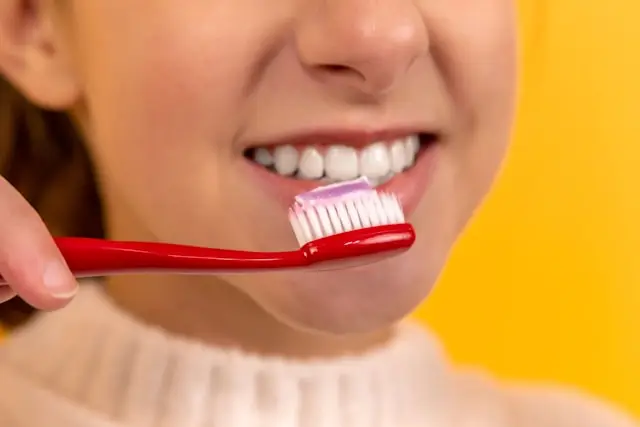When it comes to maintaining good oral health, the type of toothpaste you choose can make a big difference. A common debate among many people today revolves around fluoride vs non-fluoride toothpaste. Some people swear by fluoride’s cavity-fighting abilities, while others prefer natural, fluoride-free alternatives.
What is Fluoride Toothpaste?
Fluoride is a mineral found naturally in various foods and water. In toothpaste, it’s added to help strengthen tooth enamel, the outer layer that protects your teeth. Fluoride works by preventing the demineralization of enamel, which is the breakdown of minerals caused by acids and bacteria in your mouth. This process is especially important in reducing cavities.
Benefits of Fluoride Toothpaste
One of the biggest benefits of fluoride toothpaste is its ability to protect against cavities. Fluoride strengthens weakened enamel and even helps reverse the early stages of tooth decay. It’s often recommended by dentists for both children and adults because of its proven track record in maintaining healthy teeth.
Fluoride toothpaste also helps with the remineralization process, which is when minerals like calcium and phosphate are redeposited onto teeth after they’ve been eroded by acids. This makes teeth stronger and more resistant to decay over time.
Common Ingredients in Fluoride Toothpaste
Fluoride toothpaste typically contains either sodium fluoride or stannous fluoride. Both types are effective, though stannous fluoride is known for providing additional benefits like reducing gum inflammation and sensitivity. You might also find other helpful ingredients such as calcium carbonate or xylitol, which aid in cleaning and refreshing your mouth.
Each of these ingredients plays a role in supporting overall dental health and hygiene, making fluoride toothpaste a reliable option for those wanting to prevent decay and keep their teeth strong.
What is Non-Fluoride Toothpaste?
Non-fluoride toothpaste is an alternative for those who prefer to avoid fluoride, whether due to health concerns, allergies, or a preference for more natural products. These toothpastes are formulated with different active ingredients aimed at cleaning the teeth and promoting oral health without the use of fluoride.
Instead, they often contain natural minerals, plant extracts, or compounds like hydroxyapatite, which helps rebuild tooth enamel, or xylitol, known for its ability to fight bacteria.
Benefits of Non-Fluoride Toothpaste
One of the primary reasons people choose non-fluoride toothpaste is to avoid potential fluoride toxicity, especially in young children who may be more likely to swallow toothpaste. While fluoride is generally safe in small amounts, some people are concerned about the risk of overexposure, particularly if they already get fluoride from other sources like drinking water.
Non-fluoride toothpaste is also a popular choice for those who want to use natural or organic products. Many of these toothpastes are free from synthetic chemicals and are often marketed to those with sensitive gums or teeth. They can be gentler on the mouth while still providing effective cleaning, fresh breath, and plaque control.
Popular Non-Fluoride Toothpaste Brands
In recent years, the demand for non-fluoride toothpaste has grown, leading to more options on the market. Some well-known brands offer fluoride-free varieties, like Tom’s of Maine and Hello. These brands focus on natural ingredients and often appeal to people looking for sustainable, eco-friendly products. Other options may include brands that use plant-based or mineral-based ingredients to promote oral health while avoiding synthetic additives.
Non-fluoride toothpaste can be an effective option for individuals who have sensitivities, prefer natural ingredients, or want to minimize their fluoride intake without sacrificing oral hygiene.
Fluoride vs Non Fluoride Toothpaste: Key Differences
1. Effectiveness in Cavity Prevention
One of the most significant differences between fluoride vs non fluoride toothpaste is how well each type prevents cavities. Fluoride toothpaste is widely recognized for its ability to strengthen enamel and fight tooth decay. It’s been studied extensively and is recommended by dental professionals for reducing cavities in both children and adults. The fluoride in the toothpaste bonds with the enamel, making it more resistant to acids produced by bacteria in the mouth.
On the other hand, non-fluoride toothpaste relies on alternative ingredients like xylitol or hydroxyapatite to help prevent cavities. While these ingredients can be effective in reducing bacteria and supporting enamel strength, they haven’t been studied as comprehensively as fluoride. Therefore, non-fluoride toothpaste may not offer the same level of cavity protection, especially for people who are more prone to tooth decay.
2. Safety Concerns
The safety of fluoride is another point of debate. While fluoride toothpaste is generally safe for daily use, some people are concerned about overexposure to fluoride, which can lead to a condition known as dental fluorosis, particularly in children. This condition causes white spots or streaks on the teeth when too much fluoride is ingested during tooth development. Although this is primarily an aesthetic issue and doesn’t affect function, it has made some people cautious about using fluoride toothpaste, especially for young kids.
Non-fluoride toothpaste, by contrast, is often marketed as a safer alternative, particularly for families with young children. Since it doesn’t contain fluoride, there’s no risk of fluorosis, and parents don’t need to worry as much if their kids accidentally swallow toothpaste. For those who are concerned about potential health risks associated with fluoride, non-fluoride toothpaste provides a chemical-free, natural alternative.
3. Suitability for Different Age Groups
The choice between fluoride vs non fluoride toothpaste can also depend on age. Fluoride toothpaste is typically recommended for adults and older children who can spit out toothpaste after brushing. Its proven effectiveness in preventing cavities makes it a go-to for long-term oral health. However, for very young children, especially those under six, many dentists recommend non-fluoride toothpaste to minimize the risk of fluoride ingestion.
For adults who are looking to maintain strong enamel and prevent decay, fluoride toothpaste remains a strong choice. Meanwhile, non-fluoride options may be more appropriate for those who prefer to avoid fluoride for health or personal reasons or who are seeking a more natural oral care routine.
Who Should Use Fluoride Toothpaste?
1. People at High Risk of Cavities
Fluoride toothpaste is often recommended for individuals who are more prone to cavities. People with a history of frequent tooth decay benefit significantly from fluoride’s enamel-strengthening properties. If your dentist has advised you that your teeth are more vulnerable to decay due to weakened enamel or previous dental issues, fluoride toothpaste can help protect your teeth and reduce the risk of further cavities.
2. Adults and Teens
Fluoride toothpaste is ideal for adults and teens who want to maintain strong, healthy teeth as they age. Enamel naturally wears down over time, and the protective effects of fluoride help reinforce this barrier against bacteria and acids that cause decay. Teens, in particular, may find fluoride toothpaste beneficial, especially if they’re undergoing orthodontic treatment, like braces, which can make teeth more difficult to clean thoroughly. The added cavity protection fluoride offers can make a big difference during this time.
Guidance from Dentists
Most dentists strongly advocate the use of fluoride toothpaste, especially for those who live in areas where the water supply doesn’t contain fluoride or for individuals who consume a lot of sugary foods and drinks. Dental professionals trust fluoride as a reliable way to prevent decay and support long-term oral health. Regular use of fluoride toothpaste is often part of a comprehensive dental care routine recommended by experts worldwide.
In many cases, fluoride toothpaste is the go-to option for anyone seeking a reliable, evidence-backed method of protecting their teeth from cavities. If you’re unsure whether fluoride is right for you, a quick consultation with your dentist can help determine what’s best based on your dental history and lifestyle.
Who Should Use Non-Fluoride Toothpaste?
1. Children Under Six
For children under the age of six, non-fluoride toothpaste is often the safer choice. Since young kids are still developing their brushing habits, they may accidentally swallow toothpaste while brushing. Ingesting too much fluoride can lead to dental fluorosis, which affects the appearance of their developing teeth. Non-fluoride toothpaste allows parents to ensure their children are practicing good oral hygiene without the risk of consuming excess fluoride. Many children’s toothpaste brands offer fluoride-free options designed specifically for young users.
2. People Allergic to Fluoride
While rare, some individuals have allergies or sensitivities to fluoride. If fluoride toothpaste causes irritation or discomfort, switching to a non-fluoride option can provide relief while still maintaining oral hygiene. These individuals can still find effective toothpaste that contains natural antibacterial ingredients like xylitol, which helps reduce harmful bacteria in the mouth and protect against plaque buildup.
3. Health-Conscious Individuals
Non-fluoride toothpaste is popular among people who prioritize natural, chemical-free products. Many non-fluoride brands focus on organic or plant-based ingredients, which appeal to those looking for a more natural approach to oral care. These options often omit synthetic chemicals, preservatives, and artificial flavorings, making them a cleaner alternative for individuals concerned about what they’re putting in their bodies.
Additionally, for those living in areas where fluoride is added to the public water supply, non-fluoride toothpaste provides an option to reduce fluoride exposure while still maintaining effective oral hygiene.
Fluoride vs Non-Fluoride Toothpaste – Which is Right for You?
Choosing between fluoride vs non fluoride toothpaste comes down to personal needs and preferences. Fluoride toothpaste is a well-established option for those looking to prevent cavities and strengthen enamel, particularly for adults, teens, and people prone to tooth decay. It has been recommended by dental professionals for decades due to its proven effectiveness.
On the other hand, non-fluoride toothpaste provides a natural alternative for those who wish to avoid fluoride due to health concerns, allergies, or a preference for chemical-free products. It’s also an excellent option for young children or individuals who already receive fluoride from other sources like drinking water.
Ultimately, the best toothpaste is one that fits your unique dental needs and lifestyle. If you’re unsure which type is right for you, consult with your dentist to make an informed decision that supports your long-term oral health.
Find the Best Dental Solutions for Your Family at Wakefield Dental in Cambridge, OH
When it comes to decisions about your oral health, like choosing between fluoride or non-fluoride toothpaste, you deserve guidance from a team that understands your unique needs. At Wakefield Dental in Cambridge, OH, Dr. Darcy Wakefield and her experienced team are committed to providing personalized dental care for every member of your family.
Book an appointment today and let Dr. Wakefield help you achieve a lifetime of healthy, confident smiles.

